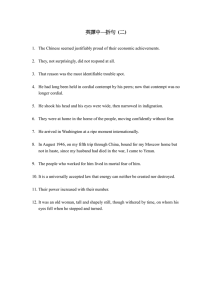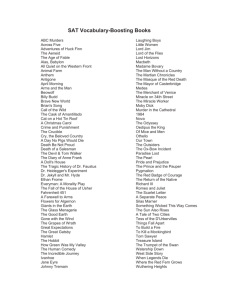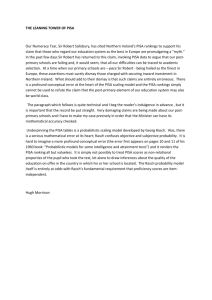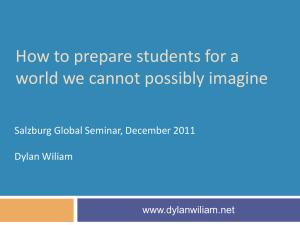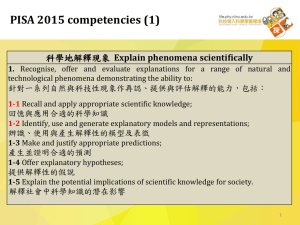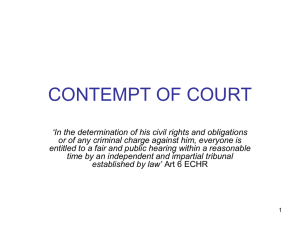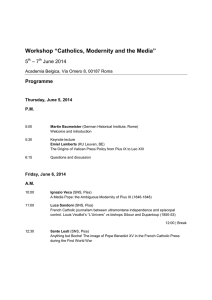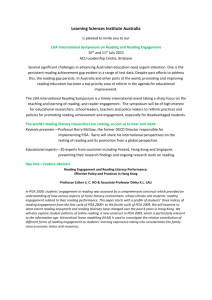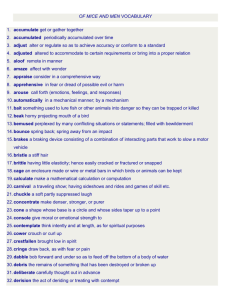English-Chinese Translation: Sentence Splitting & Combining
advertisement
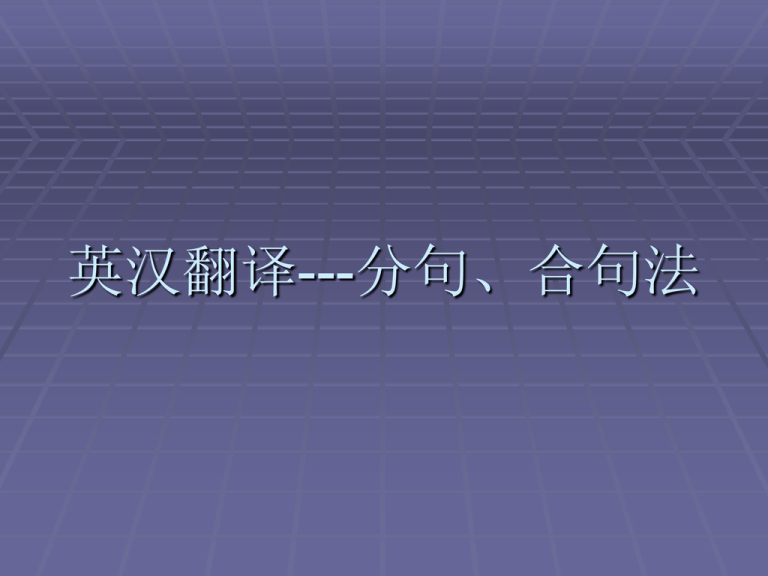
英汉翻译---分句、合句法 定义 分句法---把原文的一个简单句译成两个或 两个以上的句子。 合句法---把原文两个或两个以上的简单句 或一个复合句在译文中用一个单句来表达。 一、分句法 (一)、把原文中的一个单词译成句子,使原 文的一个句子分译成两个或两个以上的句子。 副词 1) The Chinese seemed justifiably proud of their economic achievements. 译文:中国人似乎为他们在经济上取得的成就而自豪, 这是合乎情理的。 2)Incidentally, I hope to get better medical treatment in these countries than I can Possibly get here in the United Stated. 译文:我希望能在这些国家得到比我在美国这里所能 得到的更好的治疗。 3) They, not surprisingly, did not respond at all. 译文:他们根本没有答复,这是不足为奇的。 4)He wished he were at home. Ordinarily, he would have been there three hours ago. 译文:他真愿那时候已在家里。要是在往常 的日子里,他早已到家三小时了。 5) Illogically, she had expected some kind of miracle solution. 译文:她满想会有某种奇迹般的解决办法。这是不 合情理的事。 6) But, occasionally, through haste or carelessness, mistakes were made, so that at the end of the business day one teller would be short on cash, the other long. 译文:但是,偶尔也有这种情况,由于仓促匆忙或 者粗心大意而造成错误,结果当天停业结算时, 有的出纳会短了现金而另一个却会多了现金。 形容词 1)Chairman Mao might have spoken with understandable pride of his policy of “self-reliance”. 译文:毛主席在谈到他的“自力更生”的政 策时,也许有些自豪感,这是可以理解的。 2)That region was the most identifiable trouble spot. 译文:那地区是个麻烦的地方,这是大家最 容易看得出来的。 3) He had long been held in cordial contempt by his peers; now that contempt was no longer cordial. 译文:长期以来,他的同僚虽然看不起他,却还是 对他有些亲切感,现在,除看不起他之外,亲 切感也没有了。 4) He stalked away, but with a gnawing uncertainty in his breast. 译文:他昂首阔步地走开,心里半信半疑,感到十 分苦恼。 名词 1) A movie of me leaving that foxhole would look like a shell leaving a rifle. 译文:我离开哪个担任掩体速度之快,要是 拍成电影的话,会象出膛的子弹一样。 2) He shook his head and his eyes were wide, then narrowed in indignation. 译文:他摇了摇头,两目睁得圆圆的,接着 又眯成一条线,脸上露出了愤怒的神色。 3) As a place to live, it left much to be desired. As a secret training base for a revolutionary new plane, it was an excellent site, its remoteness effectively masking its activity… 译文:作为居住的地方,这里有许多不足之处。但 作为完全新型飞机的秘密训练基地切实非常理 想的。它地处边陲,人们不易了解其中的活 动…… 4) The inside of each tent depended on the personality of its occupants. 译文:每个帐篷内怎样的布置,这要看各个使用者 的性格了。 (二)把原文中的一个短语译成句子,使原文的一个 句子分译成两个或两个以上的句子。 分词短语 1)They were at home in the home of the people, moving confidently without fear. 译文:他们在群众佳丽感到自在,行动时心里踏实,无忧无 虑。 2)She sat with her hands cupping her chin, staring at a corner of the little kitchen. 译文:她坐在那儿双手拖着下巴,眼睛凝视着小厨房的一角。 3)Sunrays filtered in wherever they could, driving out darkness and choking the shadows. 译文:阳光射入了它所能透过的所以地方,赶走了黑暗,驱 散了幽影。 4)He was lying on his side watching her. 译文:他侧身躺着。双目凝视着她。 5)But they had become nomads of the desert, living on the ground and under the sky, and they loved it . 译文:可是他们都变成沙漠里的牧民了,生 活在苍天之下,黄土之上。他们可也喜欢 这种生活。 名词短语 1)I wrote four books in the first three years, a record never touched before. 译文:我头三年写了四本书,打破了以往的 记录。 2)The military is forbidden to “kill” the vessel, a relatively easy task. 译文:(政府)禁止军方“击毁”这艘潜艇, 虽然要击毁该艇并不怎么费事。 3)The station chief would have to be close to the director, a member of the inner circle. 译文:这位站长就得接近董事,因为董事是核心集 团的成员。 4)Energy can neither be created nor destroyed, a universally accepted law. 译文:能量既不能被创造也不能被消灭,这是一条 普遍公认的规律。 5)The hospital was already spreading a fame for its food. 译文:这个医院伙食好,这点已远近闻名了。 前置词短语 1)In August 1946, on my fifth trip through China, bound for my Moscow home but not in haste, since my husband had died in the war, I came to Yanan. 译文:1946年八月,我在回莫斯科家的途中,第五 次路过中国;由于我丈夫已在战争中牺牲了, 当时我并不急于回去,就到了延安。 2)Their power increased with their number. 译文:他们人数增加了,力量也随之增强。 3)He arrived in Washington at a ripe moment internationally. 译文:他来到华盛顿,就国际形式来说,时 机正合适。 4) Doctors and men both talked about a miracle drug constantly almost with awe. 译文:医生和伤病员常常叹气一种神奇的药 物,而且谈时几乎都带着一种敬畏的口气。 5) The answer had been there all of the time just out of reach. 译文:答案一直摆在那里,可(他)就是没 有拿到手。 6) Mr. Myles still smiled but his voice had a little bit of irritation in it, unusual to Rob. 译文:麦尔斯先生仍然面带微笑,可是他的 口气却有点不耐烦了。 (三) 把原文的一个句子拆开,译 成两个或两个以上的句子。 1)Sometimes Mrs. Cross would be walking around in the big kitchen watching him eat. 译文:有时,克罗斯太太一面在大厨房踱来踱 去,一面看他吃饭。 2)She had made several attempts to help them find other rental quarters without success. 译文:她已试了好几次,要帮他们另找一所出 租的房子,结果并未成功。 3)But another round of war in the region clearly would put strains on international relations. 译文:但是,如果该地区再次发生战争,显 然会使国际关系处于紧张状态。 4)His failure to observe the safety regulations resulted in an accident to the machinery. 译文:因为他没有遵守安全规则,机器出了 故障。 5) The ample yard in back is dominated by heavily bearing fruit trees. 译文:屋后是个宽敞的院子,大部分都给果实累累 的果树占据了。 6) David opened the door, and Arthur went out into the rain. 译文:大卫把门打开,亚瑟走出去,冒着雨。 7) He wanted to tell John how surprised he was at his knowledge but embarrassment made him hold his peace. 译文:他想告诉约翰,他没有料到他的知识有这么 渊博,但是觉得有些不好意思,没有说出口。 二.合句法 (一)把原文中两个或两个以上的简单句 (Simple sentence)译成一个单句。 1)It was on the early morning of April 2, 1971. The pilots were briefed in the ready room. 译文:1971年4月2日清晨,飞机驾驶员都在待 命室接受飞行任务。 2)He was very clean. His mind was open.. 译文:他为人单纯而坦率。 3)There are men here from all over the country. Many of them are from the South.. 译文:从全国各地来的人中有许多是南方人。 4) His father had a small business in the city of Pisa. This city is in the north of Italy near the sea. 译文:他的父亲在意大利北部近海的比萨开小铺。 5) It was half past ten. Sarie watched the path anxiously. 译文:十点半钟的时候,莎丽焦急地朝着小路张望。 6) That was long ago. A very long time ago. Almost 30 years ago. 译文:那件事发生在很久很久以前,将近三十年了。 7) He would miss many things and many people. He would miss Celia. 译文:他会想念许许多多往事、许许多多朋友、也 会想念他的西莉亚。 (二)把原文中的主从复合句(Complex sentence)译成一个单句。 1)When I negotiate, I get nervous. When I get nervous, I eat. 译文:我在谈判时总有些紧张。紧张时我就 吃点东西。 2)When we praise the Chinese leadership and the people, we are not merely being polite. 译文:我们对中国领导人和中国人民的赞扬 不仅仅是出于礼貌。 3)I’m blest if II know. 译文:我一点也不知道。 4) He stood on the curb till a car shot by. 译文:他站在路边等车飞快地开过去。 5) While he washed, he heard the doorbell. 译文:他洗澡时听到了门铃声。 6) When I came to the summit, I became very excited. 译文:到达山顶时我非常兴奋。 7) If we do a thing, we should do it well. 译文:我们要干就要干好。 (三)把原文中的并列复合句(Compound sentence)译成一个单句。 1)From Florence the river Arno ran down to Pisa, and then it reached the sea. 译文:阿诺河从佛罗伦萨流经比萨入海。 2)In 1844 Engels met Marx, and they became friends. 译文:1844年恩格斯与马克思相遇并成了朋友。 3)The time was 10:30, and traffic on the street was light. 译文:十点三十分的时候,街上来往的车辆稀少了。 4)It was 1953, and I had just come from Kilkelly, Ireland, to seek my fortune. 译文:一九五三年,我刚从爱尔兰的克尔克勒来此 找出路。 5)It was an LST, and it was already nearly loaded with trucks and armored cars. 译文:这是一艘几乎已装满了卡车和装甲车的坦克 登陆艇。 6)It was in mid-August, and the repair section operated under the blazing sun. 译文:八月中旬,修理人员在骄阳下工作。 Homework
